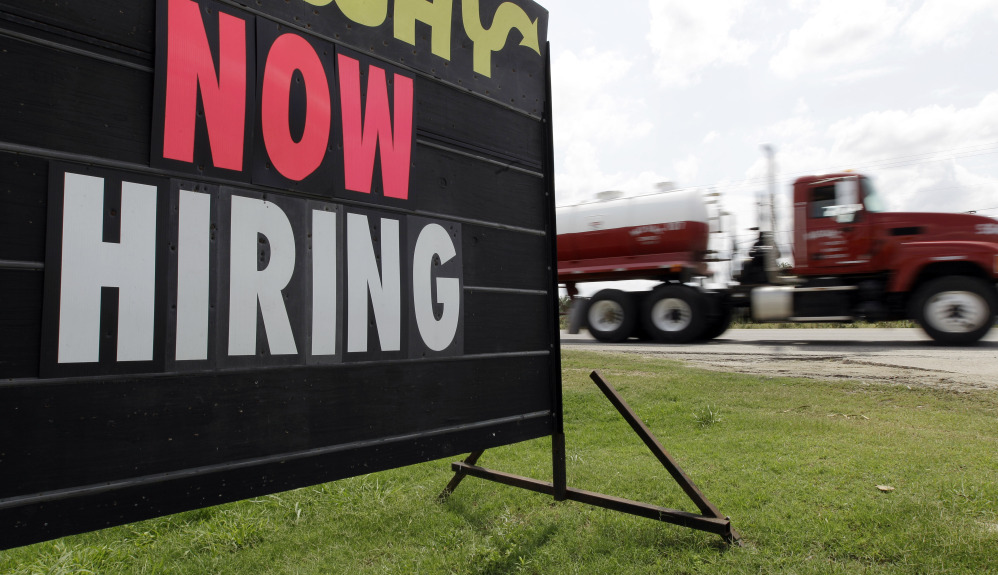WASHINGTON — With the Federal Reserve edging into the spotlight, Friday’s jobs report for August could trigger eventual changes in Americans’ financial lives.
That’s because a healthy job gain would provide one of the final pieces of evidence the Fed needs to start raising interest rates from record lows on Sept. 17, which many economists expect it to do. It would also send a reassuring signal that global stock-market turmoil and China’s slowdown have yet to seriously jar the U.S. economy.
Analysts have forecast that employers produced a healthy increase of 220,000 jobs last month, according to data provider FactSet. Such a gain would extend a hiring streak that has added an average of 243,000 jobs a month for the past 12 months. Economists have predicted that the unemployment rate dipped to 5.2 percent from 5.3 percent in July.
That rate is within the range that Fed officials have said is consistent with a healthy economy. Combined with another solid job increase, a further drop in unemployment would raise the probability that the Fed will increase rates for the first time in nine years.
Many economists have long predicted that the Fed would lift rates in September. But the turbulence in global stock markets, a U.S. inflation rate persistently below the Fed’s target level and a sharp economic slowdown in China have scrambled their assumptions. Most economists say the Fed will at least want markets to stabilize before they raise rates.
Still, after three years of solid job growth that has put nearly 8 million Americans back to work, Fed officials are probably satisfied with the job market’s progress.
Eric Rosengren, president of the Federal Reserve Bank of Boston, said Tuesday that the Fed’s desire to see further improvement in hiring “has largely been met.”
Likewise, David Joy, chief market strategist at Ameriprise, said, “I think they feel pretty good about where the job market is.”
Once the Fed begins raising borrowing rates, higher rates are likely to eventually ripple through the economy. Americans could face higher costs for mortgages and other loans, though the increases could be modest and gradual.
But Joy thinks the Fed may still hold off on a rate rise at its next meeting because of China’s weakening economy, which has slowed growth in countries such as Brazil and Australia that supply it with raw materials.
A stumbling global economy and stronger dollar, which makes U.S. exports costlier overseas, could slow growth for the next 12 months, according to Goldman Sachs. In part, that’s why Joy thinks a disappointing jobs report could lead the Fed to delay a rate hike, particularly if stock prices plummeted in response.
Joseph LaVorgna, chief U.S. economist at Deutsche Bank, notes that job reports for August typically fall short of economists’ expectations. The elimination of millions of summer jobs can complicate the data.
In case of a subpar August jobs report, it might be hard for the Fed to conclude that the economy was strong enough to withstand a rate hike, he said.
“The reality is that people tend to focus on the latest number, and not the trend,” he said.
A key question is how the stock market turbulence and China’s troubles might affect the overall U.S. economy. The answer probably won’t be clear for months. So far, the effect has been minimal.
Smaller companies and services firms, which are largely insulated from global trends, are still doing well. Service sector companies, such as restaurants, retailers, banks and construction companies, are expanding at the fastest pace in nearly a decade, according to a survey by the Institute for Supply Management.
The number of Americans seeking unemployment remains low by historical standards – evidence that companies are still confident enough about customer demand to maintain their staff levels.
The Conference Board’s consumer confidence survey showed nearly 22 percent of Americans said jobs were plentiful in August.
Copy the Story LinkSend questions/comments to the editors.



Success. Please wait for the page to reload. If the page does not reload within 5 seconds, please refresh the page.
Enter your email and password to access comments.
Hi, to comment on stories you must . This profile is in addition to your subscription and website login.
Already have a commenting profile? .
Invalid username/password.
Please check your email to confirm and complete your registration.
Only subscribers are eligible to post comments. Please subscribe or login first for digital access. Here’s why.
Use the form below to reset your password. When you've submitted your account email, we will send an email with a reset code.